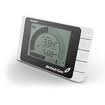Smart Meters to be Installed by Energy Suppliers by 2020
As part of the overall attempt to reduce carbon emissions the UK government want all UK homes to have smart meters installed by 2020.
The big 2020 target is to reduce all UK carbon emissions by some 34% which is legally binding and part of the pre budget report set out in November 2009. This target is tough and is it estimated that 30% of all carbon emitted is by UK households so this initiative to have smart meters in every home is part of that plan.
It is thought that each meter will cost around £320 each and show people in real time exactly how much gas and electricity they are using in real time. In theory it is believed that homes could save up to £100 per year in energy bills because of this introduction and change in habits but the UK government advisors have suggested this figure is much smaller and just £28 per year. Hardly worth it really.
On the other side, it’s the energy companies that will have to pay for the installations – or rather the householders themselves through increased gas and electric bills. British Gas have already launched their energy smart program which includes a free energy monitor on certain tariffs to manage electricity only so this is definitely a step in the right direction.
 This programme roll out is not expected to start until 2013 but the continued presence in the media of such initiatives and from the energy companies could kick start the whole process as we have already seen from British Gas. The Conservation party say that if they got into power they would accellerate the roll out plan and ensure that every home has access to a smart meter by 2017 – still short of some other countries in the EU and around the world but better than the current plan.
This programme roll out is not expected to start until 2013 but the continued presence in the media of such initiatives and from the energy companies could kick start the whole process as we have already seen from British Gas. The Conservation party say that if they got into power they would accellerate the roll out plan and ensure that every home has access to a smart meter by 2017 – still short of some other countries in the EU and around the world but better than the current plan.
This initiative is part of the central government communications model whereby the energy companies purchase the meters and install them in peoples’ homes but the data is then centrally managed so it is not owned by the energy suppliers. This seems reasonable as many people change electricity and gas providers on an annual basis and ensures that accurate unbiased data is collected by the meter, able to be seen by the home owner and passed onto a central point where billing systems can access the information.
Of course this may look like a further development of central government big brother tactics if they know exactly what energy you are using on a regular basis. Previously governments have used data like this to impose fines on people (such as with the Inland Revenue who fine folks for just about any misdemeanour) so we shall see what happens with this centrally accessed data.
Some campaigners say this just doesn’t go far enough because it simply shows what is happening in a home so it is thought that helps and guidance will follow so if consumption is higher than average we will find out how to reduce our carbon emissions as well as just knowing what has happened.
Joel Hagen of a smart meter development company suggested “”While smart meters will result in more accurate bills, they will not provide people with the information they need to manage their energy usage and cut costs,” he said. “Consumers will only change their energy consumption if they can understand how much energy they are using when they switch on the kettle or put the washing machine on.”